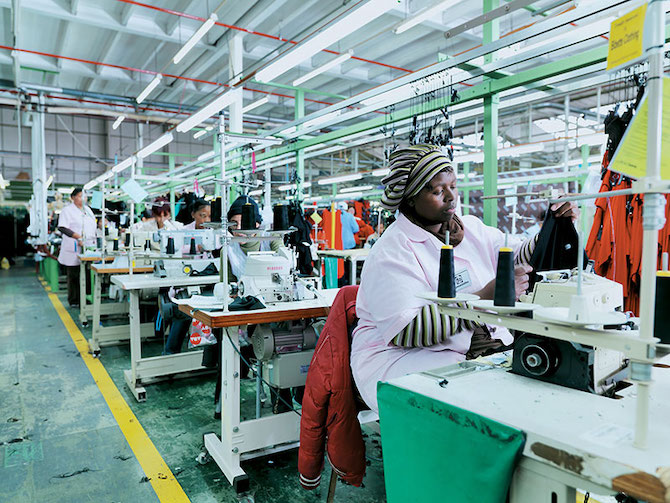by Jostein Hauge and Christian Parschau

There are growing fears that automation will displace jobs, based on the expectation that new technological developments will make jobs redundant faster than ever before, leaving little room for human work. Some studies highlight that manufacturing jobs are particularly at risk. This trend is especially worrying for developing countries because of the importance of labour-intensive manufacturing for economic development.
Based on the growing body of literature that predicts automation-related unemployment, we decided to carry out a critical literature review of forecast studies in this area, as well as gather industry- and country-specific evidence. Our research suggests that unemployment levels will most likely be at the lower end of the forecast scenarios, particularly in developing countries.
The Impact of Automation on Employment: A Brief Summary of the Literature
The fear of job losses due to automation is not a new phenomenon. In fact, we can trace it all the way back to the nineteenth-century Luddite protests, when textile workers in Great Britain destroyed machines in fear of being replaced by them. These fears have been proven mostly unfounded as subsequent industrial history has unfolded.
Even with respect to restructuring of the labour force, which tends to happen over time regardless of changes in employment levels, changes have been more modest than what many people think. For example, James Bessen at Boston University found that of the 270 occupations in the 1950 US census, 232 of them (86%) still exist today. 37 of these disappeared either because of changes in consumer demand or technological obsolescence. Only one occupation disappeared due to automation: elevator operators. However, some scholars argue that this time things will be different, especially because of advances in artificial intelligence.
Among recent forecast studies that predict the impact of automation on employment in the future, the most important thing to note is that their estimates vary widely. For example, Carl Frey and Michael Osborne at Oxford University estimate that 47% of US jobs are at high risk of automation over the next two decades, whereas Melanie Arntz, Terry Gregory and Ulrich Zierahn at the OECD find that only 9% of US workers (and 6–12% of workers in all OECD countries) are at high risk of their jobs becoming automated. The global consultancy firm McKinsey estimates that 60% of all occupations in the world contain at least 30% technically automatable activities – although this study does highlight that automation is more likely to lead to restructuring of the labour force rather than large-scale unemployment. In developing countries, the World Bank predicts that two thirds of all jobs are susceptible to automation. According to the McKinsey study, manufacturing is in the top three of automatable activities, particularly low-skilled manufacturing in developing countries such as the work of sewing machine operators.
All these studies use abstract and high-level simplifications which, by virtue of being high-level, are bound to ignore many important technical, commercial, industry, and country-specific factors. This, combined with the lack of literature on developing countries, motivated us to look at the impact of automation on employment in a specific industry in a specific developing country. In the context of developing countries, South Africa is particularly interesting because it is among those few developing countries adopting some new automation technologies.
The Case of the Apparel Industry in South Africa
Interviews with company representatives and consultants for the apparel industry in South Africa served as our main source of evidence to understand the impact of automation on employment in this sector. We also interviewed government and union representatives to triangulate arguments and deal with bias due to vested interests. In total, we carried out 26 interviews.
The first and most interesting of our findings is that increasing automation has not led to reduced employment in the South African apparel industry. In fact, in some cases, it has been linked to increased employment. This is because, in most cases, automation has led to higher productivity, which in turn has led to lower prices and increasing demand from retailers.
Second, barriers specific to South Africa and the apparel industry have prevented or slowed the adoption of automation. These include, most importantly, access to capital (as the profit margins in the global apparel industry are small, thus limiting investment in new capital equipment) technical limitations (machines for some processes cannot deal well with the variation of input materials, forcing companies to retain some manual processes), and skills limitations (as digital control and computerisation require skills that most technicians in the industry do not have).
Third, forecasting studies seem to underestimate the challenges of automating sewing work, the most labour-intensive task in the apparel industry; it is unclear how new technologies will solve existing problems related to handling fabric.
Conclusion
Essentially, automation not only displaces jobs but also creates them through a number of economic compensation mechanisms. In developing countries, a range of additional technical and financial barriers can potentially slow or prevent the adoption of automation technologies, as our research has highlighted. However, automation can certainly lead to declining employment and deindustrialisation, as we have seen in the case of many advanced economies. This variation in impact between industries and countries is important to capture, which is why our research has focused upon a specific industry in a developing country – too many forecast studies use abstract approaches, ignoring country-specific and industry-specific factors.
The literature in this field is still underdeveloped and rich opportunities for further research became apparent during the course of our project. Our case study has shown the value of focusing on particular contexts, and we think that considering different industries (for example, the automotive industry) may highlight further barriers and specificities not covered in forecasts and may allow for more realistic predictions of the future impact of automation. This would also open up for cross-industry analyses to further explore how power relationships within global value chains and pricing strategies affect growth opportunities and the impact of automation on employment.
While it is not possible to predict the future with certainty, our research suggests that unemployment levels will most likely be at the lower end of the forecast scenarios, particularly in developing countries. Automation seems to pose a relatively small threat to labour-intensive industrialisation in the near future.
This is part of a series emerging from a workshop on ‘Mediterranean Production Networks and the Export Economies of North Africa‘ held at LSE on 17 January 2020. Read the introduction here, and see the other pieces below.
In this series:
- Introduction by Shamel Azmeh
- The Scandal of Seamless Linkages: Global Value Chains and Women Argan Oil Producers in Morocco by Kate Meagher
- COVID-19, Digitalisation and Manufacturing-Led Development in African Countries by Karishma Banga
- Luxury Brands’ Roles in Pathways to Sustainable Growth: Prospects for Egypt’s Cotton Sector by Rachel Alexander
- Have North African countries upgraded and diversified in apparel and automotive GVCs? by Thomas Bernhardt
- Varieties of Digitalisation in Automotive Supply Chains and Upgrading Prospects of Supplier Firms by Merve Sancak







Fascinating discussion and viewpoint.